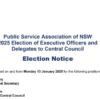Donald Trump’s return to leading the United States might be largely the subject of mere incredulousness to Australians, but it will undoubtedly change aspects of our lives.
One thing of concern to public servants, and to workers and trade unions in general, is the sudden shift to the right, and the pen-stroke termination of rights and protections for more vulnerable people in the workforce.
Those of us who use social media platforms that are run from the Meta data-farms have likely seen Mark Zuckerburg’s new tech-bro look and heard his convolved dialogue about freedom of speech and redirection. Which translates to allowing a bit of hate speech and unreferenced scientific and political information, and slant to the right – a less Californian, much more Texan Meta.
Mr Zuckerburg said he’d like to see workplaces change now Mr Trump is back in charge. Speaking on The Joe Rogan Experience the Meta boss said, “A lot of the corporate world has become pretty culturally neutered … having a culture that celebrates the aggression a bit more has its own merits…”
This, along with Mr Trump slashing diversity programs for the US’s public service, official recognition of only male and female genders, and Elon Musk, the new head of the Department of Government Efficiency (DOGE), giving the ‘Roman’ salute at Trump’s inauguration, are crystal clear signs of how the next four years will shape workplaces in the US.
Over the ditch in New Zealand, the nation’s comparably excellent record of Indigenous relations and lauded treaty are under serious threat. New Zealand’s National Party, by Australian standards, was not historically a particularly rightist party – instigating or supporting many socially cohesive policies. However, its 2023 victory and formation of a majority three-party coalition government with the ACT and NZ First parties has seen the conservatives indicate a proposed reinterpretation of the Treaty of Waitangi.






Closer to home, Queensland’s Liberal National Party premier, David Crisafulli axed the special commissioner for equity and diversity Linda Colley and decided to discontinue the role in January this year.
The Labor Government of Anastasia Palaszczuk established the Office of the Special Commissioner, Equity and Diversity, in response to a key recommendation of the 2019 Review of public sector employment laws – A fair and responsive public service for all. The role had been a success, achieving a 30 per cent reduction in the public sector gender pay gap between 2021 and 2024.
Yet the Queensland Government does not wish to continue this.
Thankfully, large Australian employers have indicated they have no immediate plans to scrap any diversity programs they have active in their respective HR departments. And the NSW Public Sector achieved a 66 per cent approval rate for inclusion and diversity from its own employees in the 2024 People Matter Survey. And it’s doubtful the Minns Government have any appetite to go backwards in this area.
There is a federal election this year, though, and Opposition Leader Peter Dutton touts himself as a leader who will work well with Mr Trump. He is also no fan of workplace reforms that make conditions better for employees. Indeed, in reaction to Dutton’s plans for workers if he is elected, ACTU president Michele O’Neil said, “He made it absolutely explicit that he will turn secure jobs into casual jobs”. And if Queensland’s Mr Crisafulli is anything to go by, equity and diversity in the workplace will be an early casualty under Mr Dutton.
Workplace equity has always been led by the union movement. And the PSA has an outstanding history of agitating for equity and diversity in the NSW public sector.
The PSA began advocating for equal pay for women in 1910, and literally did not stop pushing state and federal governments until it was granted, some six decades later.
The union was one of the first Australian unions to establish a dedicated women’s unit, creating the Women’s Auxiliary, later the Women’s Council in 1930. Maternity leave was won for NSW public servants thanks to the PSA in 1957, and that leave was improved in 1971 when it was extended to unmarried women, and then lengthened from nine weeks to fourteen weeks in 2005. The PSA was also the first union in Australia to win Domestic Violence Leave for public sector workers. More recently, thousands of workers in the Department of Education, primarily women, won permanent jobs after years of temporary employment.
Of course, the PSA represents and fights for all members regardless of gender. But something we have always done is to ensure any public servant who may be more vulnerable for any reason can rely on the union. And it is largely thanks to the PSA that the NSW Public Sector is comparably an even and safe employer.
It is only through a strong union that we can push back hard against any anti-equality moves that may begin to seep into Australia’s largest state Public Sector.
















Leave a Comment
Your email address will not be published. Required fields are marked with *